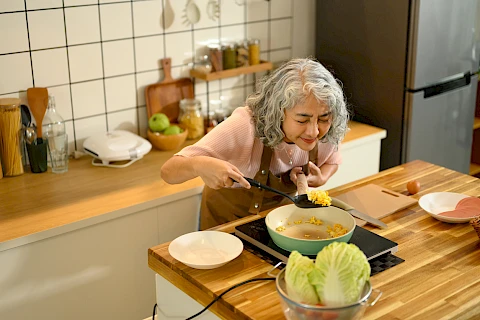
A reduced sense of smell and taste can often occur as we age. This natural process can make it challenging to identify spoiled food, posing a risk to health and safety, particularly for seniors. Ensuring food safety is crucial, as consuming spoiled food can lead to illnesses. Learn some practical strategies to help seniors and their caregivers manage foods that have a short shelf life with Senior Helpers Westford, ensuring food safety and peace of mind.
The Challenges of Reduced Sense of Smell
Aging affects the senses, including taste and smell. These changes can make it harder for seniors to notice when food starts to spoil. For example, milk, deli meats, and fresh produce are common items with short shelf lives that can pose risks if consumed past their prime.
Strategies for Managing Food Safety
Consider the following strategies to help manage food safety despite a reduced sense of smell:
Labeling and Dating
Knowing when food was purchased or opened is key to avoiding spoilage. Labeling foods with their purchase or open dates can serve as a guide to determine freshness. Create a simple system, such as using sticky notes or permanent markers, to write dates visibly on packaging.
Visual and Textural Cues
Other senses can help detect food spoilage. Take note of any unusual colors or slimy textures that could indicate spoilage. Regularly inspect food items visually as a primary method of ensuring they are still fresh.
Temperature and Storage
Proper storage plays a vital role in keeping food fresh. Ensure your refrigerator is at the right temperature, ideally below 40°F, to slow down spoilage. Organize your fridge by storing older items upfront and freshly bought items in the back to minimize waste and keep track of what needs to be consumed first.
Relying on Technology
Technology can be an excellent ally in food safety. Use smartphone apps to track food freshness and receive alerts for when items should be consumed. Consider investing in smart fridges that can monitor food expiration dates and send automatic notifications.
Involving Caregivers and Family
Discuss food safety openly with seniors to ensure everyone is aware of the strategies in place. Caregivers can help monitor and manage food for seniors, ensuring that any changes in the food's condition are promptly addressed. Family members can help by regularly checking in and assisting with food shopping or meal prepping.
Discover Personalized Senior Care Services
Detecting off food can be challenging for those with a reduced sense of smell, but adopting certain practices can make it easier. Maintaining food safety is about preventing illness and ensuring the well-being and autonomy of older adults. For personalized support and assistance in Westford, Tewksbury, Lowell, and Concord, contact us at Senior Helpers Westford today. Our team is here to help seniors live safely and independently through compassionate care services.